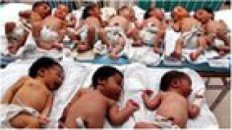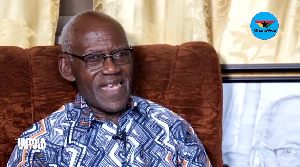- Home - News
- TWI News | TV
- Polls
- Year In Review
- News Archive
- Crime & Punishment
- Politics
- Regional
- Editorial
- Health
- Ghanaians Abroad
- Tabloid
- Africa
- Religion
- Election 2020
- Coronavirus
- News Videos | TV
- Photo Archives
- News Headlines
- Press Release
General News of Thursday, 4 April 2013
Source: Ghanaian Times
3,044 newborns die within two years

A total of 3,044 newborn babies died within the Greater Accra Region between the year 2011 and 2012.
During the same period, a total of 438 maternal deaths were also recorded in the region. The major cause of the deaths was attributed to inadequate midwives and specialists, especially within urban slums in Accra.
The Greater Accra Regional Director of Health Services, Dr Linda Van Otoo disclosed this yesterday in Accra at the 2013 Greater Accra Regional Health Forum and press soiree organised by the Greater Accra Regional branch of the Ghana Health Coalition of NGOs in Health.
It was themed: “Civil Societies Advocating for Strong Recognition of Sexual and Reproductive Health Rights and the Unmet Health MDGs, Targets and Indicators in the post 2015 development framework”.
The forum which was funded by the Embassy of the Kingdom of Netherlands brought stakeholders in the health sector and media practitioners together to discuss challenges of achieving the health MDGs within the Greater Accra and instigate action toward post 2015 development agenda.
Dr Van Otoo said in 2012, a total of 1,987 babies died, an increase over the 2011 figure which was 1,057.
Additionally, in 2011, a total of 242 pregnant women died which is also an increase over the 2010 figure which was 163 and 196 in 2012, Dr Van Otoo blamed the deaths on poor referral systems, lack of blood and blood products in the health centers, and delays on the part of medical practitioners to attend to pregnant women on time.
According to her, maternal and child deaths within the Greater Accra Region between 2006 and 2012 keep increasing and there was the need for a concerted effort from all stakeholders to curb the menace.
The Greater Accra Chairperson of the Coalition of NGOs in Health, Rev. Mrs Anna Brantuo expressed concern that no provision was made in this year’s budget for civil society organizations.
She, therefore, called on government to resource them adequately, considering the complementary role they play in health care delivery in the country.
She identified some cultural practices as a challenge to the rights campaign in the country.
A reproductive health specialist, Mr Kwasi Amenuvor charged the youth to be interested in sexual and reproductive health issues and called for the establishment of youth reproductive centers within health facilities across the country to educate the youth on the matter.










